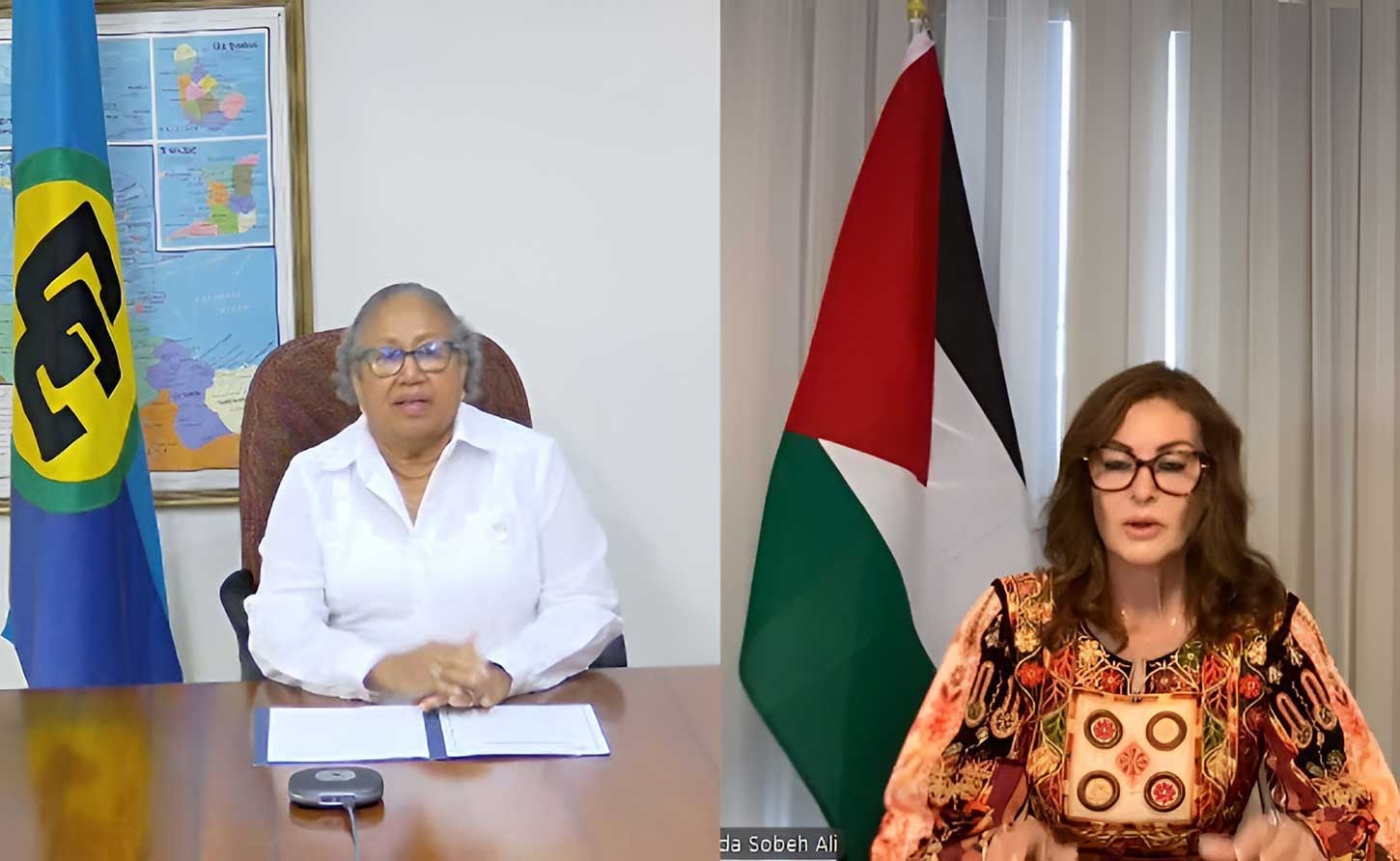CARICOM | Caribbean Nations Welcome Palestine's First Ambassador as Conflict Rages On

MONTEGO BAY, Jamaica July 4, 2025 - In a virtual ceremony that bridged continents on July 2, CARICOM Secretary-General Dr. Carla Barnett accepted credentials from Her Excellency Dr. Linda Sobeh Ali, Palestine's inaugural Ambassador to the 14-nation Caribbean bloc.
The moment marked more than diplomatic protocol—it represented the culmination of a 13-year journey toward Caribbean unity on one of the world's most contentious issues.
"Your accreditation marks a truly historic and profoundly symbolic moment," Dr. Barnett declared from the CARICOM Secretariat headquarters. The ceremony, though conducted virtually, carried the weight of decades of Caribbean foreign policy evolution.
The path to this moment began in earnest when all 14 CARICOM states finally aligned their positions on Palestinian statehood by May 2024, with Barbados, Jamaica, Trinidad and Tobago, and The Bahamas being the final holdouts.
The Caribbean's diplomatic chess game had been influenced by years of U.S. pressure, but the horrific images from Gaza—broadcast live into Caribbean living rooms—changed everything.
The timing couldn't be more poignant. As Ambassador Ali presented her credentials, the latest UN figures showed over 56,000 Palestinians killed in Gaza since October 2023, with more than 132,000 injured. The numbers include thousands of women and children, casualties that have mounted since a ceasefire collapsed in March 2025.
Dr. Barnett didn't mince words about the crisis that has galvanized Caribbean opinion. "The catastrophic levels of hunger, severe malnutrition, and preventable diseases due to dire shortages of food, clean water, and medical supplies are unacceptable," she stated, her voice carrying the frustration felt across the region.
The Secretary-General's language grew sharper when addressing Israeli settlements: "We strongly urge an end to the illegal settlement of the occupied Palestinian Territories, a clear violation of international law."
Such direct diplomatic language from CARICOM—typically measured in its international statements—signals how deeply the Gaza crisis has affected Caribbean sensibilities.
The Caribbean community's solidarity with Palestine didn't develop overnight. Ten CARICOM nations had already recognized Palestine as early as 2011, maintaining this position wasn't antisemitic—all 14 Caribbean nations maintain continuous diplomatic relations with Israel, some dating back to the 1960s. The relationship is about principles, not picking sides.
But the current conflict changed the calculus. When the U.S. vetoed Palestine's UN membership bid in April 2024, it likely pushed the remaining Caribbean holdouts toward recognition. Even Belize went further, suspending diplomatic relations with Israel entirely in response to Gaza operations.
Dr. Barnett highlighted how CARICOM leveraged its temporary UN Security Council presidency through Guyana in June 2025 to amplify Palestinian voices on the world stage. For small island states often struggling to be heard internationally, using their diplomatic capital for Palestine represents a significant commitment.
The human cost driving this diplomatic evolution is staggering. UN reports detail how 82.6% of Gaza now falls within Israeli-militarized zones or under displacement orders, with over 684,000 people displaced again since March. UNICEF reports an average of 112 children daily are admitted for malnutrition treatment.
These aren't just statistics to Caribbean leaders who've seen their own nations devastated by hurricanes and economic crises. Dr. Barnett specifically thanked Palestine for its solidarity during Caribbean natural disasters, highlighting bonds forged in mutual support during tough times.
The appointment of Ambassador Ali comes as Palestine continues expanding its diplomatic footprint globally. As of March 2025, 147 of 193 UN member states recognize Palestinian statehood—just over 75% of the global community.
Each new embassy and ambassador represents another crack in the diplomatic isolation that has long constrained Palestinian aspirations.
For CARICOM, welcoming Palestine's ambassador isn't just about Middle Eastern politics—it's about the principle that international law must mean something. As Dr. Barnett put it, the accreditation reflects "our shared interest in strengthening diplomatic ties through an enduring commitment to the principles of international law, justice, and peace."
In a world where small nations often feel powerless against larger forces, the Caribbean's unified stance on Palestine sends a clear message: size doesn't determine the strength of one's convictions.
As images of Gaza's suffering continue filling screens across the Caribbean, this diplomatic milestone represents more than ceremony—it's a statement that some principles are worth standing for, regardless of the pressure to remain silent.
The virtual ceremony may have lasted just minutes, but its significance will resonate far longer, marking another step in Palestine's long journey toward international recognition and the Caribbean's commitment to justice, even when it's inconvenient.
-30-
